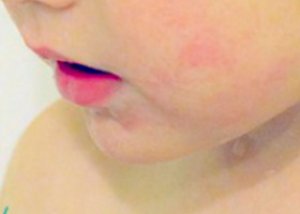
All iLive content is medically reviewed or fact checked to ensure as much factual accuracy as possible.
We have strict sourcing guidelines and only link to reputable media sites, academic research institutions and, whenever possible, medically peer reviewed studies. Note that the numbers in parentheses ([1], [2], etc.) are clickable links to these studies.
If you feel that any of our content is inaccurate, out-of-date, or otherwise questionable, please select it and press Ctrl + Enter.
Eczema in a baby may be the result of a vitamin PP deficiency in the mother
Medical expert of the article
Last reviewed: 02.07.2025
 ">
">Leading British scientists - scientific representatives of the University of Southampton - have proven that a lack of nicotinamide (vitamin PP) during pregnancy increases the risk of eczema in a newborn baby. Experts are sure that insufficient levels of vitamin PP and its metabolic products play a key role in the pathogenesis of eczema. Such unique information is a kind of continuation of the recent assumption that children can acquire a tendency to develop eczema in the womb. If we believe the new conclusion of scientists, then it is possible to successfully solve the problem of the disease in babies by means of medicinal or nutritional correction of the level of nicotinamide in the blood of a pregnant woman. "To confirm the relationship we have discovered, more research is needed. However, we are confident that we are moving in the right direction and will soon be able to prevent the development of eczema," says Dr. Kate Godfrey, head of the Center for Biomedicine for the Study of Nutrition in Southampton.
The essence of the study was as follows. The specialists measured the level of a number of substances present in the bloodstream of pregnant women. In total, almost five hundred expectant mothers were examined. The level of kynurenine, kynurenic and anthranilic acids, vitamin PP and tryptophan, N1-methylnicotinamide were determined. All examinations were carried out in the last trimester of pregnancy. Then the study continued after the birth of newborn children. The specialists checked the relationship between the content of the above vitamin substances and their metabolic products, which were determined in the mother's blood plasma, with cases of children's eczema. Indeed, such a relationship was found, but only when the children were 6-12 months old.
No such connection was observed from the moment of birth to six months. Scientists were unable to explain why the problem appeared so late. “External preparations containing vitamin PP have been used for many years to relieve symptoms of eczema. But scientists have examined the relationship between the level of nicotinamide in the blood of a pregnant woman and the risk of developing a disease such as atopic dermatitis for the first time. At the moment, specialists can think of effective preventive measures that involve a special diet and taking special vitamin preparations,” a leading British dermatologist comments on the results of the study. You can read about the study in full on the pages of the popular periodical “Journal of Clinical and Experimental Allergology”.
The staff and representatives of the University of Southampton describe in detail each new stage of the experiments. By the way, nicotinamide and nicotinic acid are contained in sufficient quantities in peanuts, pine nuts, pistachios, turkey meat, mackerel, horse mackerel and tuna, as well as in liver and green peas.


 [
[